Samsung Odyssey OLED G8 (G80SD) review: a top class 4K OLED monitor
This stellar display does gaming, streaming, and more
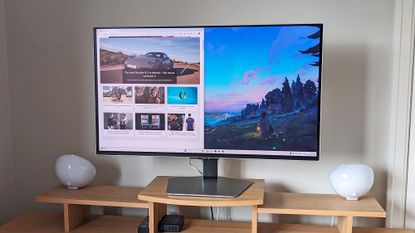
The Samsung Odyssey OLED G8 (G80SD) excels for gaming and does everything else to a very high standard too. Assuming 32-inches is the sweet spot for you, you have the budget for an OLED screen, and you don't want it curved, then this is one of the best out there.
-
+
Superb OLED display
-
+
Built-in smart apps
-
+
Subtly stylish aesthetic
-
-
TV interface isn't the very best
-
-
No USB-C ports
Why you can trust T3

If you're in the market for one of the best gaming monitors available, the Samsung Odyssey OLED G8 (G80SD) is well worth your consideration. It's the latest in the excellent Odyssey line-up (see previously), but this G8 model uses a flat rather than a curved screen.
That's really a question of personal preference, as to whether or not you want your screen wrapping around in front of your face. It's also a question of budget too – generally speaking, curved monitors tend to be more expensive than the traditional, flat type.
This Samsung Odyssey OLED G8 review will tell you everything you need to know about this monitor, and whether it's the right upgrade for you – from how easy it is to assemble, to how your games will look on this particular screen.
Samsung Odyssey G80SD: price & availability
The Samsung Odyssey OLED G8 (G80SD) is now widely available to purchase. Check out the widget above for the best prices online in your region.
At the time of writing, this monitor is available for around £1,100 in the UK and $1,500 in the US. In the UK, it's available from retailers including Amazon as well as direct from Samsung.
Samsung Odyssey OLED G8 review: design & setup
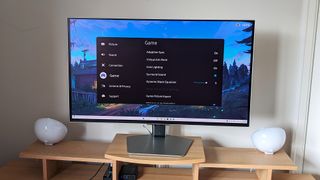
At this stage we're well used to the Samsung Odyssey aesthetic: light grey metal, black plastic, and some quite sharp angles. The Samsung Odyssey OLED G8 continues the theme, giving us a minimal and easy-on-the eye design that's neither particularly inspiring nor particularly offensive. I do like the cool coloured ring light around the back, which is stylish in a subtle kind of way.
You shouldn't have any problems setting up the G80SD, and there's no need to find any tools or even turn a d-ring thumbscrew. The base clips into the stand with a push and a turn, and then the stand clips into the back of the monitor. Having the ports on the back face directly outwards rather than down is a welcome variation on the norm, making it easier to get everything connected.
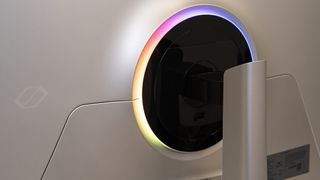
Those ports are made up of 2x HDMI 2.1 and 1x DisplayPort 1.4, plus a USB-B and two USB-A ports which you can use as a hub. These point straight out of the back of the monitor, which I actually prefer – even if a lot of monitor manufacturers don't. There's some simple cable management around the back too.
While there's a bulge at the back where the stand connects, overall the monitor is impressively thin. The base, meanwhile, is nice and wide and solid. In general, it's aesthetically easy on the eye, and it's pretty functional too – the tiny joystick around the back is straightforward to use, and you also get an included remote control for even easier access to the monitor's features and settings.
Samsung Odyssey OLED G8 (G80SD) review: features & picture quality
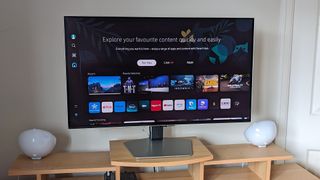
Samsung has deployed its third-gen QD-OLED tech here (that's Quantum Dot OLED), which essentially means a few technical tweaks and refinements to boost brightness and colour further, as well as making these panels more durable and less power-hungry. It offers a 4K resolution (3840 x 2160 pixels), and comes with a new dynamic cooling system to minimise the risk of overheating issues.
Other stats you need to know about are the 240Hz maximum refresh rate, the 0.03ms grey-to-grey response time, and the support for AMD FreeSync Premium Pro and Nvidia G-Sync technologies (to reduce blurring). It's an impressive specs list alright, and I'm pleased to say it means a top-tier viewing experience too: in all the games we played the monitor passed with flying colours.
Speaking of colours, they are sharp, vibrant, and well-balanced – with fantastic deep blacks, thanks to the OLED panel. Whether on horseback or in a racing car (neither literally, as I'm sure you guessed, instead I've been sat on one of the best gaming chairs instead), I didn't spot any motion blur or ghosting, showing the monitor's ability to keep up with the fastest action on screen. It's a real pleasure to game on.
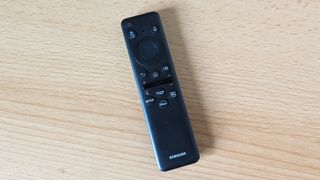
The same goes for general-purpose computing and watching video content too – though you might want to turn off the ring light around the back when you're not gaming. Text is crisp and sharp, movies look fluid and detailed, with no issues when it comes to blooming or inconsistent lighting or contrast.
It's also worth mentioning the NQ8 AI Gen 2 processor that's on board here. It's the same one you'll find in Samsung's flagship televisions, such as the Award-winning S95D OLED, and it means that even when your source content is less than stellar 4K quality, you're still going to end up with a fantastic-looking picture almost all of the time.
Some features we've seen on other Samsung monitors: there's a Game Mode for quick access to gaming settings, and a Tizen-powered smart TV hub that supports the most common streaming apps (and even cloud gaming). You also get a perfectly decent built-in 10W stereo speaker system. Add it all up, and not only is it a brilliant gaming monitor, it's also a brilliant 32-inch 4K monitor full stop.
Samsung Odyssey OLED G8 review: verdict
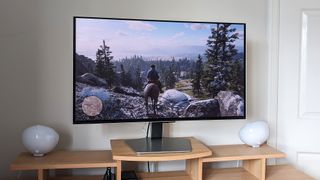
The Samsung Odyssey series has long impressed us with the quality of its displays and everything else that goes along with them, and the latest G8 model is no different. Assuming you like the look of this monitor and your budget is somewhere in the right ballpark, it's a fantastic choice for your next upgrade.
This was one of those occasions when I was very reluctant to pack up the review unit and return it, because it really does excel in every area. It's great as a gaming display, it's great as a smart TV hub, and it's also stylish-looking and well-built. It's the sort of device you struggle to find anything to complain about.
Considering the quality of the OLED panel and the versatility of this monitor, it's definitely a 5-star screen. Throw in the smart TV aspects as well – so you don't need to plug in a streaming box or dongle, if you don't have one – and you've got even more reasons to make this your next monitor purchase.
Also consider
We've reviewed plenty of other Samsung Odyssey gaming monitors, and the standard has been consistently high, so there alternatives to this G80SD model. Take the Samsung Odyssey OLED G93SC, for example, which is an ultrawide monster that's going to dominate any room you put it in – it's yours for around £1,600 in the UK and $2,200 in the US, and gives you a total of 49-inches of screen space, corner to corner.
Another gaming monitor that's recently impressed the T3 team is the Asus ROG Swift OLED PG32UCDM. Like the G80SD, it's 32-inches corner to corner, and flat, and it also uses OLED technology for the display. At £1,350 / $1,300 it's on the expensive side, but not overly so for an OLED monitor in this sort of bracket – unlike the Samsung monitor we've reviewed here though, it doesn't have any built-in speakers.
Upgrade to smarter living
Get the latest news, reviews, deals and buying guides on gorgeous tech, home and active products straight to your inbox.
Dave has over 20 years' experience in the tech journalism industry, covering hardware and software across mobile, computing, smart home, home entertainment, wearables, gaming and the web – you can find his writing online, in print, and even in the occasional scientific paper, across major tech titles like T3, TechRadar, Gizmodo and Wired. Outside of work, he enjoys long walks in the countryside, skiing down mountains, watching football matches (as long as his team is winning) and keeping up with the latest movies.
-
 Think all winter jackets are the same? Adidas’ new MYSHELTER Down Parka is about to change your mind
Think all winter jackets are the same? Adidas’ new MYSHELTER Down Parka is about to change your mindThe brand’s latest release packs serious tech into a sleek silhouette
By Matt Kollat Published
-
 HBO's new rom-com looks like perfection for the holiday season
HBO's new rom-com looks like perfection for the holiday seasonSweethearts looks like amazing coming-of-age fun
By Max Freeman-Mills Published
-
 Hidden sci-fi horror gem is the perfect boxset binge – season 3 is rated 100%
Hidden sci-fi horror gem is the perfect boxset binge – season 3 is rated 100%From season 3 is streaming on MGM+ right now – but you can catch seasons 1 and 2 on NOW in the UK
By Mike Lowe Published